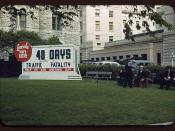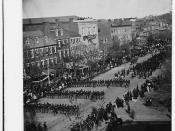Lincoln
Lincoln won a decisive victory in the electoral college: with 180 votes, he was well ahead of Breckinridge, in second, with 72 votes (indeed he had a comfortable majority of 180 to 123).
However, Lincoln received only 40% of the popular vote (1,866,000 votes)
His victory was very much a sectional one: with not a single ballot cast for him in ten of the 33 states, his support was heavily concentrated in the Northern free states.
Douglas
1,383,000 popular vote
Douglas was the only candidate to draw substantial support from all sections. Indeed he was the only candidate to have electoral votes from both free and slave states.
However, because his strength was scattered he fared badly in the electoral college (he only secured the electoral college votes of Missouri and 3 of New Jersey's 7). Total of just 12.
Breckinridge
843,000 popular vote.
Breckinridge carried most of the South.
However, he received relatively few votes in the North despite his endorsement by Pierce, Buchanan, and a majority of Northern Democratic Congressmen.
Bell
He drew nearly all his votes in the border states.
593,000 votes.
Points to consider
Even if the opposition had combined against him in every free state, Lincoln would still have won. Therefore, this shows the limitations in the arguments that Lincoln won because of the divisions within the Democrats.
However, in terms of the popular vote, Lincoln was very much a minority President who relied on the North.
Therefore, a majority of the vote was given to candidates who supported the possible future expansion of slavery. Douglas, Breckinridge and Bell were all prepared to see slavery expand and together they won 60% of the vote.
The election did not make secession inevitable. No-one had run a secessionist ticket. Indeed, the more radical Democrats who...


![[Abraham Lincoln, Congressman-elect from Illinois. Three-quarter length portrait, seated, facing front] (LOC)](https://s.writework.com/uploads/7/77419/abraham-lincoln-congressman-elect-illinois-three-quarter-le-thumb.jpg)